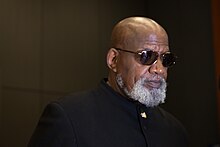Harry Edwards (sociologist)
Harry Edwards (born November 22, 1942 in East St. Louis , Illinois ) is an African-American sports sociologist and founder of the Olympic Project for Human Rights . He is considered to be the initiator of the Black Power Protest at the 1968 Summer Olympics .
Life
Edwards studied at Fresno City College from 1959 to 1960 on a scholarship because he could be used in four sports. 1961–1964 he continued his studies as a discus thrower with an athletics scholarship at San José State University , which he completed with a BA in sociology . Since 1950 he was the first African American competitive athlete to graduate from the university because the university exploited competitive athletes but did not qualify them. Edwards continued his studies at Cornell University and was considered one of the first sociologists who dealt with the problem of black athletes. From 1966 to 1968 he was visiting professor at San José State University. Here he organized the African American students. In 1967, San José became the first university to skip a football game because of fear of race rioting. The Olympic Project for Human Rights he founded provided both for the Black Power campaign at the Olympic Games and for the cancellation of the indoor athletics festival of the New York Athletic Club . While the Olympic Games were still in progress, Edwards was writing his first book: The revolt of the black athlete (1970), which was sold worldwide due to the actions in Mexico City . In 1968 Edwards returned to Cornell, where he taught sociology and received his doctorate in sociology in 1971. He then became professor of sociology at the University of California, Berkeley , where he retired in 2000. He has also worked as a consultant for the Organizing Committee of the 1984 Summer Olympics and various professional teams in California. Edwards does not see himself as a revolutionary, but as a committed admonisher for the equality of African-Americans, whereby he has the sport in mind because of the role model effect. In 1967/68, however, he was still an enemy of the American sports establishment and was systematically monitored by the FBI.
Publications
- Black student-athletes: taking responsibility. California Living, 1984.
- Educating black athletes. In: Atlantic Monthly. August 1983, p. 253.
- The Struggle That Must Be: an autobiography. Macmillan, New York 1980, ISBN 0-02-535040-4 .
- Sociology of Sport. Dorsey Press, 1973.
- The Revolt of the Black Athlete. Collier-Macmillan, Ontario 1985.
- Sociology of Sport. Dorsey Press, Homewood, Illinois 1973, ISBN 0-256-01415-9 .
- Black Students. Free Press, New York 1970.
- For Blacks, a Life in Sports Is No Different From Life: A Reflection of Society A Threat to Survival 'Sporting Chance' Disputed Only the Best Are Kept Neglect of Other Pursuits. In: New York Times. (sports). May 6, 1979. ISSN 0362-4331 .
- Playing to Win: A Short Guide to Sensible Black Sports Participation. Institute for the Study of Social Change, Berkeley, California 1982.
- Perpetuating illusions. In: New York Times. THE WEEK IN REVIEW. May 19, 1985, p. E22. ISSN 0362-4331
Individual evidence
- ↑ Othello Harris: The rise of the black athlete in the USA. In: James Riordan , Arnd Krüger (Ed.): The International Politics of Sport in the Twentieth Century . Routledge, London 1999, ISBN 0-419-21160-8 , pp. 150-176.
- ↑ Harry Edwards: The struggle that must be. An autobiography . Macmillan, New York 1980, ISBN 0-02-535040-4 .
- ↑ Arnd Krüger, Swantje Scharenberg : Introduction. In: Dies (ed.). Times for heroes - times for celebrities in sports . Lit, Münster 2014, pp. 1–10.
- ↑ blackpast.org
| personal data | |
|---|---|
| SURNAME | Edwards, Harry |
| BRIEF DESCRIPTION | American sports sociologist who specializes in problems faced by African American athletes |
| DATE OF BIRTH | November 22, 1942 |
| PLACE OF BIRTH | East St. Louis |
